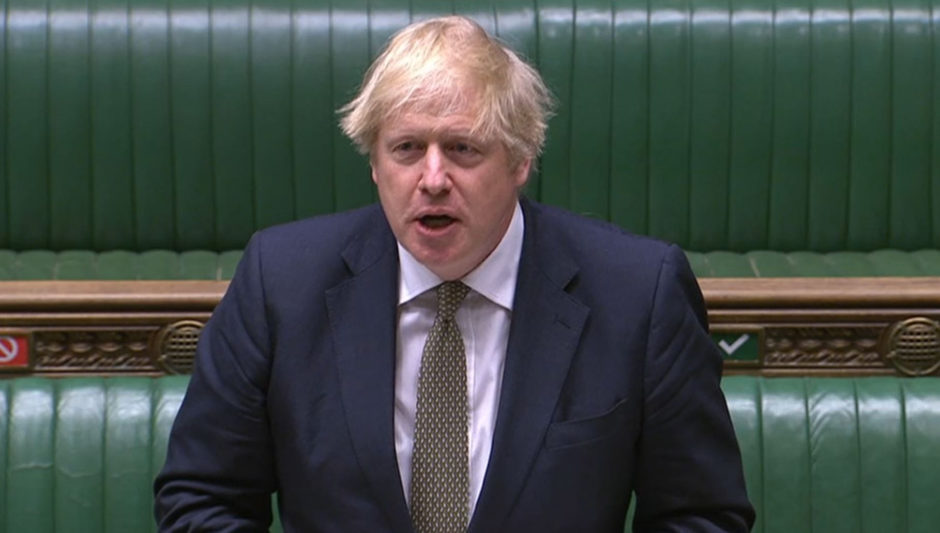
Boris Johnson pledged the deepest cuts in greenhouse gas emissions in the Group of 20 nations, aiming to put the U.K. in the vanguard of the fight against climate change.
The prime minister’s goal to reduce greenhouse gas emissions by 68% in the four decades through 2030 represents the fastest cut in heat-trapping pollution by any major economy, according to a statement from Johnson’s office in London.
It would put Britain on track to deliver net-zero emissions by the middle of the century.
The pledge is among the first enhanced commitments for 2030 under the Paris Agreement on climate change, where almost 200 nations pledged to work toward rapidly scaling back harmful gases mostly linked to burning oil, natural gas and coal.
Johnson wants to spur the ambitions of other governments to deliver their own goals in time for the next round of United Nations talks on the issue, which the U.K. is hosting next year.
“This is a global effort, which is why the U.K. is urging world leaders as part of next week’s Climate Ambition Summit to bring forward their own ambitious plans to cut emissions and set net-zero targets,” Johnson said in a statement ahead of a summit he’s hosting on the issue on Dec. 12.
The target also is a key signal to business that the U.K. is serious about decarbonizing power generation, transport and heating systems. It would deepen the 40% cut the U.K. has already achieved from 1990 levels.
The U.K. Treasury is currently undertaking a review into the annual costs of reaching net zero, which is due to be published next year. Early estimates by its climate change advisers show a cost of 50 billion pounds ($67 billion) in 2050.
The target is in line with the wider global effort to contain warming since pre-industrial times to “well below” 2 degrees Celsius, a level that still would represent the quickest shift in the climate since the last ice age ended more than 10,000 years ago.
It’s likely to require people in the U.K. to fly less, drive more electric cars, eat less meat and replace their gas boilers with greener alternatives such as heat pumps.
The U.K. pledge goes further than its existing goal to reduce emissions by 57% in the period between 2028 and 2032. That was set in 2016, when the U.K.’s longer-term aim was for an 80% reduction by 2050, rather than the current legally-binding net-zero target.
It also puts pressure on the European Union to agree on a 55% emissions cut by 2030 next week.
“Failing where the U.K. has succeeded would be hugely embarrassing internationally and a significant setback to the EU’s aspirations for its Green Deal,” said Nick Mabey, chief executive officer of the research group E3G.
China, the world’s biggest emitter, has yet to peak its emissions, and earlier this year said it aimed to achieve net zero by 2060.
The U.S., the biggest historic emitter, pulled out of the Paris deal under President Donald Trump. President-Elect Joe Biden has pledged to rejoin the pact.
By demonstrating international leadership on climate change, Johnson is seeking to showcase Britain’s global outlook, even as it negotiates an end to the transition period after its exit from the European Union.
On the domestic front, he’s also trampling on the territory of the main opposition Labour Party, which went into the 2019 general election promising a “Green Industrial Revolution.”
Johnson already appropriated that phrase last month when he outlined a 10-point plan to cut emissions, including funding for hydrogen and carbon capture and storage.
Labour welcomed the stronger U.K. target, but said the government has yet to chart how it will achieve it. The party warned that over time the restrictions on polluting industry will have to become tighter. Business groups embraced the decision.
“While delivering a 68% reduction in emissions by 2030 undoubtedly represents a real stretch, there is no doubt that business is up for the challenge as we build back better and greener following the pandemic,” said Rain Newton-Smith, chief economist of the CBI, the biggest U.K. business lobby.
The target is in line with a recommendation from the Committee on Climate Change, the government’s independent advisers on the issue. That panel said the U.K. should aim for a cut of at least 68% as part of its “nationally determined contribution” toward global efforts to fight climate change under the 2015 Paris Agreement.
The UK should commit to reduce emissions by at least 68% from 1990 to 2030 – and make clear commitments on international aviation and shipping, climate finance and adaptation.
The CCC said the U.K.’s 68% target was consistent with the latter target. The U.K. plans to submit its NDC in full, including underlying policies, to the UN on Dec. 12. The country intends to meet its target through domestic action — as recommended by the CCC — but its target excludes emissions from aviation and shipping, in line with international practice.
